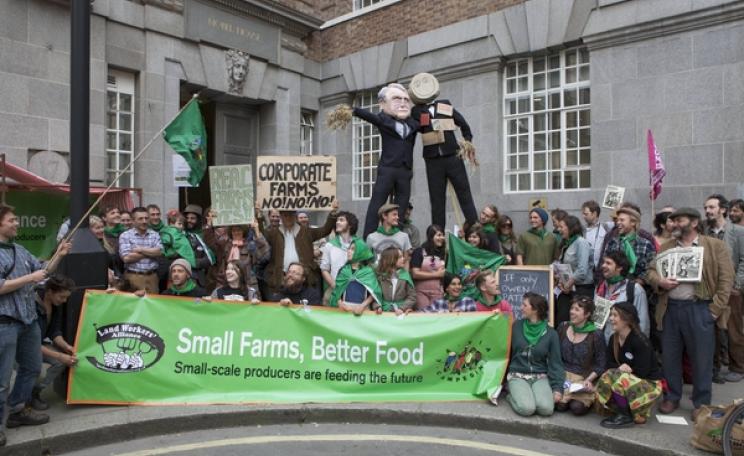Last week’s decision by Defra to license the culling of badgers in two pilot areas in an attempt to control the spread of Bovine Tuberculosis (TB) has again raised a collective gasp of dismay from the public. Indeed few people could have missed the media circus that accompanied the coalition’s original consultation on the plans launched in July 2011.
The idea of this, our most cuddly of protected mammals being rounded-up and shot was evidently too much to bear for many commentators; Labour, The Green Party and Sir David Attenborough among them, who have come out fighting to condemn the cull.
And although the campaign to “Can the Cull” has cleverly exploited the public’s appetite for defending a cute, furry animal, it has also spectacularly missed an opportunity to highlight the real reason that TB is crippling the UK’s beef and dairy farmers.
There is little doubt that there is currently a bovine TB epidemic in the countryside. Following a brief lull in the mid 1980’s incidences of Bovine TB have increased year on year with today’s levels the highest since 2001. Mr and Mrs Badger meanwhile have enjoyed a relative honeymoon period since gaining legal protection in 1992 and have increased their population accordingly.
The NFU and the coalition government, backed by the weight of several independent studies, argue that this trend demonstrates a clear link between badger populations in the UK and the spread of Bovine TB. The pro-badger camp meanwhile cite their own independent scientific papers which argue that badgers are not in fact responsible for transmitting TB to cows and that a cull would be inhumane and a waste of public money.
Unfortunately the story isn’t quite as black and white as it seems. Interestingly TB infection poses little health risk to today’s cows within an economic lifespan of 3-5 years. The reason we’re pursuing TB eradication is because we’re signed up to a European Agricultural Policy with a zero tolerance approach to TB infection. As far back as 1958 the argument was made that an unhealthy cow is an unproductive cow and does not represent maximum efficiency for the farmer or, more importantly, for the taxpayer who is subsidising them.
As a result an EU eradication policy was decided upon and compulsory TB testing of cattle was introduced to the UK in 1959. Remarkably, little has changed since then. Every farm in the country is routinely tested for Bovine TB on a one to four year cycle. If a farm is found to have a TB “Reactor” it is removed and killed and the farm is re-tested every 60 days until tests show the infection hasn’t spread throughout the herd. During this time no cattle are allowed to be moved onto, or from the farm – with added costs incurred by the farmer. In return farmers receive favourable compensation for every “Reactor” that is killed. The whole process is highly bureaucratic, unpopular with farmers and currently costs UK taxpayers £90m per year.
In order to justify this level of spending Defra first and foremost claims to be “protecting public health and maintaining public confidence in the safety of products entering the food chain”. This despite the fact that the UK Health Protection Agency has concluded that “the current risk posed by M. bovis (bTB) to human health in the UK is considered negligible” and that following an autopsy “Reactor” cattle simply enter the food chain anyway.
Defra’s second argument is that an eradication policy “protects and promotes the health and welfare of animals”. However if this was really the objective wouldn’t we simply vaccinate against the infection? Well, no – although a bTB vaccine is widely available, a vaccinated cow cannot be distinguished from a TB carrier once it arrives on the continent and so the vaccine is prohibited by EU law. Instead Defra’s third and final argument that we are “meeting international and domestic legal commitments” and “securing opportunities for international trade”, perhaps hits the nail on the head.
The UK is bound by both international and bi-lateral legally binding commitments relating to trade in agricultural goods and services. Yes these agreements allow us to make the most of our competitive advantage for producing livestock. But they also relegate livestock and farm produce to the status of any other commodity which is traded in pre-determined volumes. As a direct result we’re currently spending £90m a year protecting a live export industry which has never exceeded £3.3m in annual revenue since the BSE export ban was lifted in 1998.
Of course, one revolutionary but effective solution could be for the UK to nullify its agricultural trade tries, vaccinate the herds and retain all of our beef for domestic consumption. Our farmers could enjoy not having to compete with cheaper continental imports and instead produce slow-grown quality beef for British consumers. And although a this may never be able to compete with a fluffy badger in the eyes of the public, the badger may well end up better off when he no longer stands between a good farmer and an honest income.
Ed Hamer is a young farmer and co-editor of The Land magazine
| READ MORE... | |
 |
NEWS Asian factory farming boom spreading animal diseases like avian influenza Increasing density of livestock production and poor biosecurity in Asia is encouraging epidemics, with a new disease emerging every four months, says new International Livestock Research Institute (ILRI) report |
 |
INVESTIGATION Where will our milk come from: 'battery' farms or free range cows? The recent axing of the Nocton 'super-dairy' renewed interest in how our milk and cheese is produced. The Ecologist visited two dairy farms - an indoor, intensive unit and a year-round outdoor operation - to assess their very different approaches |
 |
NEWS Farmers could be allowed to kill badgers from 2011 Government says vaccination on its own is not enough to stop the spread of bovine TB in cattle and announces plans to grant farmers culling licences |
 |
NEWS ANALYSIS Common infections will be 'untreatable' if antibiotic misuse continues Scientists in new warning on post-antibiotic age as campaigners call for stronger controls on excessive use in intensive farming |
 |
NEWS ANALYSIS Warning as infectious salmon disease spreads from Europe's fish farms to Canada Discovery of the deadly salmon virus Infectious Salmon Anaemia in Canada is just latest likely example of disease spreading to wild fish stocks from the world's mega fish farms |








